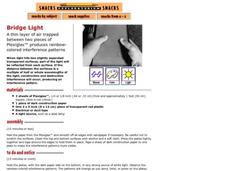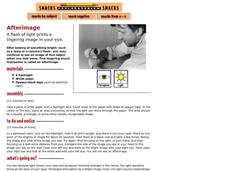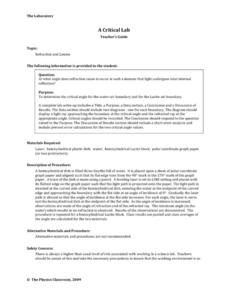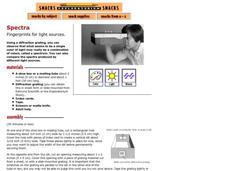Exploratorium
The Three Little Pig(ments)
Photocopy single-color images onto acetate transparencies and either demonstrate or have your class experience the combination of colors to produce images. Children will learn that cyan, magenta, yellow, and black combine to make all of...
Exploratorium
Pinhole Magnifier
Using a pinhole in an index card, learners of light find that it can be used as a magnifier.
Exploratorium
Bridge Light
An illuminating activity demonstrates how interference of light waves creates a pattern. Using Plexiglas™ and construction paper, participants see rainbows appear as they twist or press against the plastic plates. After the activity, you...
Exploratorium
Afterimage
To illuminate how afterimage occurs, create a star, square, or other geometric-shaped light for learners to look at for 30 seconds. Then, have them explain what they see as they shift their focus to a blank wall. A full explanation of...
Institute of Electrical and Electronics Engineers
Telescoping Periscope
Ahoy, matey! Here is an engineering expedition that mini mariners are sure to be swept away by! After reading a brief description and history of periscopes, they work in crews to construct one. Use this activity to enhance a...
Baylor College
Rainbow in the Room
Uncover the science behind the beautiful phenomena of rainbows with a simple demonstration. Shine light through different-sized containers of water as young scientists learn that rainbows occur when visible light is split up into its...
Physics Classroom
A Critical Lab
Physics lab groups finagle with laser lights to determine the critical angle of refraction for both water and Lucite. Because there are no detailed steps or an answer key for this enlightening exercise, an inexperienced physics...
Exploratorium
Spectra
Make a class set of spectrum tubes by first purchasing some diffraction grating, and then constructing the tools with mailing tubes or shoe boxes. If you aren't up for assembling them, you could purchase prepared spectroscope kits. This...
Exploratorium
Give and Take
Heat-sensitive liquid crystal sheets are available in a variety of sizes and temperature ranges. Purchase a class set of hand-held sheets and color half of each with a silver permanent marking pen. Learners of light can hold them under a...
Exploratorium
Corner Reflector
If you set up a triad of mirrors into a corner figuration, they act as a kaleidoscope, bouncing light waves back and forth indefinitely, changing the light that your eyes perceive. Although the materials required are very specific and...
Exploratorium
Bird in the Cage
When your life science class is learning about the eye and how it works, you can add this activity as a demonstration of how the retina holds an afterimage. After staring at a red, green, or blue bird shape, pupils glance at a cage and...
Exploratorium
Water Sphere Lens
With a Florence flask or fishbowl, make a double convex lens and use it to examine an image. Because of the refraction, the image will be inverted. A simple explanation is provided here for you to share with your class as they...
Exploratorium
Antigravity Mirror
Is it a bird? Is it a plane? It's super student! Physical science stars can fly during a unit on light as they see the reflection of one leg in a mirror, behind which the other holds them up.














